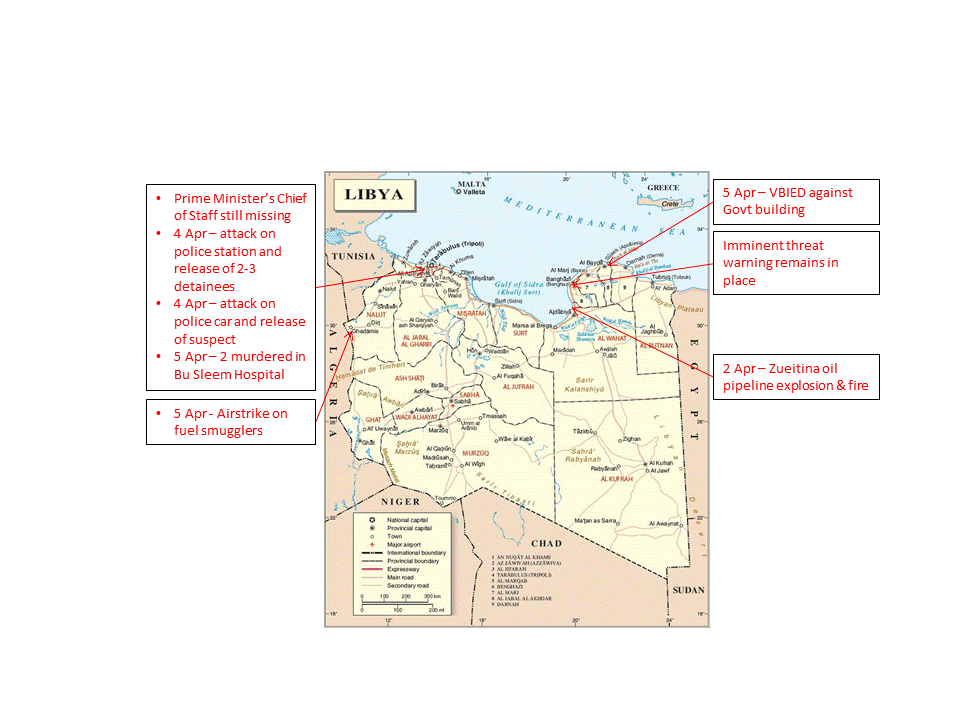Overview
The major theme this week remains the tensions over the Government’s intent to dismantle the militias and their refusal to cooperate. This should not come as any surprise as those who did the ‘heavy lifting’ to rid Libya of Gaddafi are now not keen to see their influence and hold on society diminish. It will take time for the argument to be won by the Government and for comprehensive Security Sector Reform to take place. It is, however, one of the key elements for Libya’s progression to becoming a modern democratic state. The security apparatus must be wholly owned by the state and it cannot allow armed militias to continue outside of its control and the rule of law in Libya. The current tensions and the abduction and continuing disappearance of Mohamed Ghatus, the Prime Minister’s Chief of Staff, flow from the Government’s seizure over the past week of a number of compounds and operating bases used by militias in Tripoli.
There have been the usual low-level attacks and violence directed at the Police and other elements of the Government during the week for a range of unrelated reasons. The violence remains relatively low-level with no particular pattern.
Regionally, an Egyptian court has ruled against the extradition of Gaddafi’s cousin and close aide, al-Dam, citing that he is an asylum seeker and that he won’t be guaranteed his full rights in Libya. This may be part of an wider Egyptian bargaining strategy or merely that organisations such as Human Rights Watch are continuing to pressure countries into obtaining clear guarantees from the Libyan Government that those extradited will be treated properly and will not be subject to torture.
Finally, there has been some unease and chatter in social media and other areas that the UN may be looking to intervene with a multi-national force in Libya under its continuing strong mandate – Resolution 2040. This is strongly denied by the UN Support Mission in Libya (UNSMIL) and highly unlikely given that the UN is charged with ‘assisting the Libyan authorities to define national needs and priorities throughout Libya, and to match these with offers of strategic and technical advice where appropriate.’
Tripolitania (Western Libya)
There was an outage at Libya’s State TV News Channel on the 2nd April as a result of a staff member being assaulted by one of the militia guards responsible for security at the building. Other staff members refused to work in protest at the assault. This is not the first of attacks between the members of militias and the media although low-level in scale.
4th April saw two attacks on the Police in Tripoli; the first was a storming of a police station following a small explosion by armed men who released 2-3 detainees and escaped with weapons. This was followed by an attack on a police car taking a suspect to the public prosecutor’s office from the Ben Gashir police station. The suspect escaped with the assailants. He is believed to be linked to a number of killings.
On 5th April the Bu Sleem Hospital in Tripoli was the scene for the murder of two patients in what is thought to be a revenge killing. The air force on Friday also attacked a convoy of reportedly fuel smugglers near Ghadames. 13 of the convoy are believed to have been killed in the airstrike.
Cyrenaica (Eastern Libya)
On 2nd April the National Oil Corporation announced that there had been an explosion and fire on a section of oil pipeline linking Field 103 to the export terminal at Zueitina. The blast happened on Tuesday night and the cause is not yet known. The pipeline transports both Austria’s OMV and the US’s Occidental Petroleum Corporation (Oxy) oil to the export terminal. It is not believed to have had a significant impact upon oil exports.
On 5th April there was a Vehicle Borne Improvised Explosive Device that detonated in Beida in front of a government building. A security guard was wounded and substantial damage was done to the building. It is, as yet, not clear who was responsible for the attack.
Fezzan (South-western Libya)
Nothing Significant To Report.





